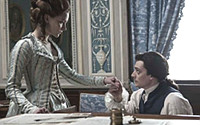| SHADOWS ON THE WALL | REVIEWS | NEWS | FESTIVAL | AWARDS | Q&A | ABOUT | TALKBACK | |||
| Interlude in Prague | |||

| |||
|
dir John Stephenson scr Brian Ashby, Helen Clare Cromarty, John Stephenson prd Brian Ashby, Huw Penallt Jones, Hannah Leader with Aneurin Barnard, James Purefoy, Samantha Barks, Morfydd Clark, Adrian Edmondson, Dervla Kirwan, Ruby Bentall, Trent Garrett, Edmund Kingsley, Charlotte Peters, Klara Issova, Anna Rust release UK 25.May.17 17/UK 1h43  Instant attraction: Clark and Barnard 


|
R E V I E W B Y R I C H C L I N E | ||
 Lavish production design and expressive performances make the most of this fictionalised story of sex and intrigue in the life of Mozart. While filmmaker John Stephenson shies coyly from the romantic entanglements to emphasis the more violent actions, the melodrama has a certain soapy appeal. And opera aficionados will no doubt enjoy the witty references.
Lavish production design and expressive performances make the most of this fictionalised story of sex and intrigue in the life of Mozart. While filmmaker John Stephenson shies coyly from the romantic entanglements to emphasis the more violent actions, the melodrama has a certain soapy appeal. And opera aficionados will no doubt enjoy the witty references.
In 1786, arts patron Baron Saloka (Purefoy) grudgingly provides funds to bring Mozart (Barnard) to Prague to conduct the final performance of The Marriage of Figaro. Saloka preys on all the women in town and doesn't want the notoriously flirtatious Mozart on his turf, especially where it concerns young soprano Zuzanna (Clark). Staying with his friend Josefa (Barks), Mozart is predictably smitten. So Saloka teams up with church emissary Novy (Kingsley) to bring Mozart down. Meanwhile, Zuzanna's parents (Edmondson and Kirwan) take more note of Saloka's status than the rumours of his brutal womanising. What follows is like an 18th century Prague 90210 as everyone skulks around playing lusty relationship games. Scenes are awash in epic wigs and soaring arias, and emotions are choked under the constricting costumes and social mores. It looks gorgeous, photographed on location in Prague with sets that seem to be lit by candlelight, and Stephenson adds a tone of realism even with all of this overwrought sumptuousness. Even so, the plot struggles to maintain its momentum, bogging down in Saloka's increasingly nasty machinations. Barnard gives Mozart a wonderfully playful edge, livening up every scene as this married father who simply can't control his passions. His scenes with the Barks and Clark (both of whom are luminescent) sparkle with knowingly illicit attraction. By contrast, Purefoy is little more than a glowering villain, a middle-aged man who takes out his lonely rage on every woman he meets. But the film never delves into such complex territory, merely painting him as a monster whose servants literally cower before him. While all of this is taking place, Mozart is composing Don Giovanni, which isn't terribly subtle. But the script uses wit and emotion to weave the film's plot into the opera. This adds some interest to both the film's musicality and it's depiction of the creation of a lasting work of art. So even if the story and characters loses their grip on the audience, there's plenty here to keep us entertained, even as things turn rather, well, operatic in the end.
| |||
| R E A D E R R E V I E W S | |||

 Still waiting for your comments ... don't be shy.
Still waiting for your comments ... don't be shy.
| |||
© 2017 by Rich Cline, Shadows on the Wall HOME | REVIEWS | NEWS | FESTIVAL | AWARDS | Q&A | ABOUT | TALKBACK | |||
